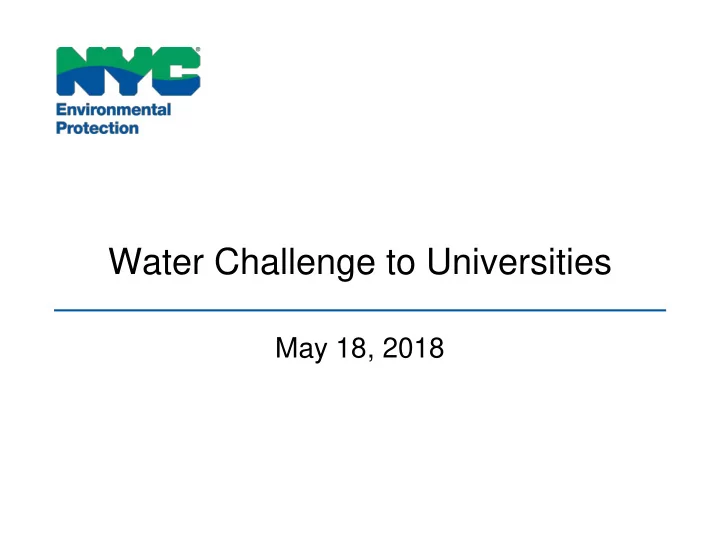

Water Challenge to Universities May 18, 2018
Agenda • Water Conservation in New York City – Water Demand Management Program – Sector-specific water challenges • Water Challenge to Universities Program – Overview and potential participants – Tracking water use and workshops – Program structure and timeline – Recognition and benefits to your university • Registration and More Information 2
Water Demand Management Program Working toward a 20 million gallons per day (MGD) reduction in current demand by 2022 Municipal: Retrofit and replace water fixtures in schools, parks, colleges, hospitals, and NYCHA, DEP and FDNY facilities Residential: Replace inefficient fixtures in residential buildings Non-Residential: Create voluntary conservation programs in various sectors and provide cost sharing System Optimization: Continue leak detection, pressure management and metering Water Supply Management: Adopt Water Shortage Rules Upstate Customers: Develop and implement demand management plans for 10 upstate wholesale customers 3
Sector-Specific Water Challenges Hotel Challenge 30,000 gallons/day 10 participants 11,000,000 gallons/year 4 winners Restaurant Challenge 26,000 gallons/day 15 participants 9,000,000 gallons/year 8 winners Hospital Challenge 35,000 gallons/day 3 participants 13,000,000 gallons/year 1 winner 4
Universities in New York City The 14 largest universities in New York City use over 2,300,000 gallons per day and 853,000,000 gallons per year for their central campus buildings and green space alone 5% reduction 120,000 gallons/day ; 43,000,000 gallon/year 230,000 gallons/day; 85,000,000 gallon/year 10% reduction 5
Universities in New York City Universities in New York City are well positioned for a Water Challenge Synergy with the New York City’s Carbon Challenge Water Conservation = Energy Conservation “Pumping, delivering, and treating water is a major driver of energy consumption, so institutions can help reduce energy use and the greenhouse gas emissions associated with energy generation by conserving water.” – AASHE Star Technical Manual AASHE’s STARS Program offers an existing framework for water conservation: • Building Operations and Management: credit available for water management or benchmarking program • Water: credit available for establishing baseline for future water reductions 6
Challenge Overview The 5% Challenge: To meet the reduction goal, participants in the University Challenge must reduce their water usage by at least 5% from their baseline consumption. The baseline is two years of water usage prior to the start of the challenge. Structure of the Program 1. Tracking Water Use. DEP will track all water usage through AMR and provide participants with monthly reports. 2. Water Reduction Strategy. Participants will be encouraged to develop a Water Conservation Campaign, mapping a strategy to meet the Challenge goal. 3. Regular Workshops. DEP will convene quarterly workshops to provide updates on the Challenge and encourage the exchange of ideas, as well as support new initiatives and/or to resolve issues as they arise. 4. One-on-One Meetings as needed. 5. Promotion and Recognition. DEP will provide promotion and recognition of the Challenge participants including press conferences, news releases, and information posted on DEP’s website. 7
Tracking Water Use and Workshops DEP provides monthly summaries DEP convenes quarterly workshops • of your water consumption Water conservation organizations • • Compares your current water Technology groups consumption with previous years • DEP’s Water -Energy Nexus Tool • Compares your water use per square foot with other challenge participants Example report from the Restaurant Water Challenge 8 8
Program Structure and Timeline Two Year Program: August 1, 2018 – July 31, 2020 Benchmarking Period: August 1, 2018 – July 31, 2020 Tentative Schedule for First Year, 2018-2019 – August: Kick off Meeting – Introduce MyDEP, how to access meter information – October: Workshop #1 – Water Conservation on Campuses – January: Share Water Conservation Campaign Plans – April: Workshop #2 – Academic Year Recap; Lessons learned – July: Workshop #3 – Water/Energy Nexus Tool Tentative Schedule for Second Year, 2019-2020 – October: Second Year Check-in Meeting; Sharing Plans and Lessons Learned – January: Workshop #4 – Industry Specialist – April: Workshop #5 – Academic Year Recap; Lessons Learned – July: Two-Year Wrap-up Meeting – Recognize Winners; Share Lessons Learned 9
Recognition and Benefits Water Reduction Goals Benefits of Participation • 5% reduction Winner • Builds off of your Carbon Challenge successes and opens a new • 7.5% reduction Silver Winner opportunity for sustainability • 10% reduction Gold Winner • Helps you earn AASHE STARS points • Contributes to immediate and long DEP will promote and recognize term cost savings participants and winners through: • Award events • News releases and p osts on DEP’s website Award Icon from Restaurant Water Conservation Challenge Hotel Water Conservation Challenge Closing Event with Assistant Commissioner of DEP’s Bureau of Environmental Planning and Analysis 10 10
Potential Challenge Participants 11
Registration and More Information Sign up for information today Formal invitation to follow Contact information waterchallenge@dep.nyc.gov 12 Photo Credit: William Warby
Recommend
More recommend